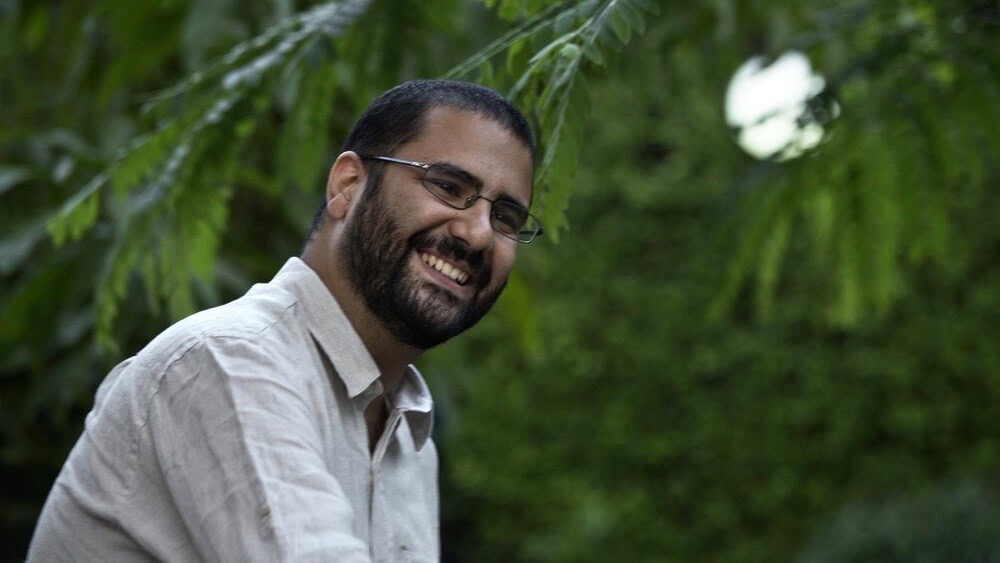Imprisoned Egyptian human rights activist Alaa Abdel Fattah stopped consuming water from Sunday, November 6 in an escalation of his months-long hunger strike against his wrongful confinement and the state of human rights in the country. Alaa’s sister Sanaa Seif announced his decision.
Alaa announced a hunger strike in April and has been taking only 100 calories a day since then. On Tuesday, he announced he would stop taking food altogether and would only consume water.
According to Alaa’s sister Mona Seif, Alaa was already weak due to his seven-month-long hunger strike and the latest move can kill him in a few days if he is not released from prison immediately. She claimed that despite the fact that this is a “risky move,” Alaa’s family decided to go ahead with it “because we have no choice.”
Sanaa is on her way to #Egypt to attend #Cop27 and raise @alaa's case.
Many think this is a risky move, they are absolutely right but we have no choice, he is on water strike and we only have limited days to save him.
The risk of losing him forever outweighs any other #FreeAlaa pic.twitter.com/hMywnwu06X— Mona Seif (@Monasosh) November 6, 2022
The escalation comes in the context of the ongoing UN climate conference in Sharm El-Sheikh in Egypt where hundreds of world leaders and climate activists have gathered to deliberate on the issues of climate change and ways to mitigate it. The COP27 meeting will go on until November 18.
Sanaa Seif, Alaa’s younger sister, who herself has been a victim of state persecution in Egypt and is now an UK citizen, decided to travel to Sharm El-Sheikh in an attempt to be a “physical reminder that exists and that is an embarrassment for everyone complicit in the crimes against my brother,” she told Middle East Eye.
My brother just had his last glass of water in prison. Please keep his story alive, it's not over. He can be saved.
This afternoon I'm flying to Sharm, I have a civil society pass. The Egyptian regime claims civic space exists in #COP27 , I'll be testing that.#FreeAlaa pic.twitter.com/e2FsfRGmft— Sanaa (@sana2) November 6, 2022
#FreeAlaa, #FreeThemAll
Sanaa launched a sit-in in front of the office of the UK Foreign Secretary last month to pressurize the government to take measures to release his brother who is also a British citizen.
British Prime Minister Rishi Sunak wrote a letter to Alaa’s family on Saturday, assuring her that his government will use the COP27 summit to lobby for Alaa’s release which is a “priority.” Similar assurances had been given by Sunak’s predecessor Liz Tuss when she was the foreign secretary in the Boris Johnson government.
Alaa was sentenced to five years in prison in December 2021, along with two other activists who received four-year jail terms. They were charged with “spreading fake news and undermining national security.” The judgement and the case itself has been widely criticized and has been termed concocted.
Before being sentenced, Alaa had already spent at least two years in prison without trial since his rearrest in September 2019. He had just been released in March after serving a five-year term for “protesting illegally.”
Alaa’s repeated imprisonments are attributed to his prominent role in the 2011 uprising against long-term ruler Hosni Mubarak and his participation in the pro-democracy and human rights movements in the country since then.
After coming to power through a coup in 2013, the Abdel Fattah al-Sisi-led regime has carried out a systematic persecution of thousands of pro-democracy activists in the country, including Alaa. According to an estimate, over 60,000 political activists, journalists and human rights defenders in Egypt have been behind bars in the past decade.
Various civil society groups participating in the COP27 summit have also expressed solidarity with the movement to free Alaa.
3/ ´Alaa El-Fattah, the Egyptian prisoner of conscience, has escalated his hunger strike that started more than 200 days ago. He has stopped drinking water. His life is now in severe danger. We call for his immediate release and the release of all prisoners of conscience´ #COP27
— Climate Action Network International (CAN) (@CANIntl) November 6, 2022
Activists are also taking part in the #FreeAlaa #FreeThemAll movement on social media.
"You Have Not Yet Been Defeated"
Sharing my foreword to Alaa Abd El Fattah's brilliant book, which he wrote from prison.
Turns out he gave #COP27 its rallying cry. #FreeAlaa #FreeThemAll https://t.co/FraJY6P0Li
— Naomi Klein "#COP27 Egypt Unsilenced" (@NaomiAKlein) November 7, 2022





